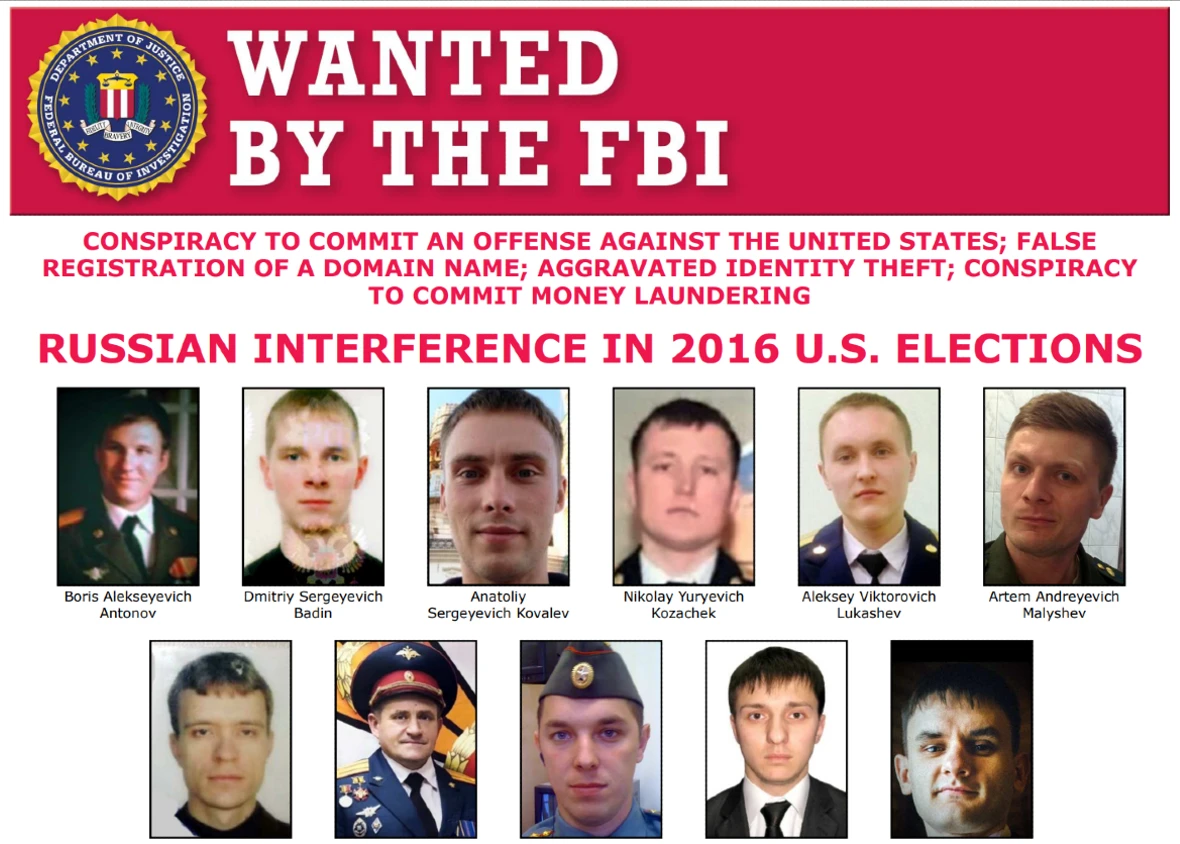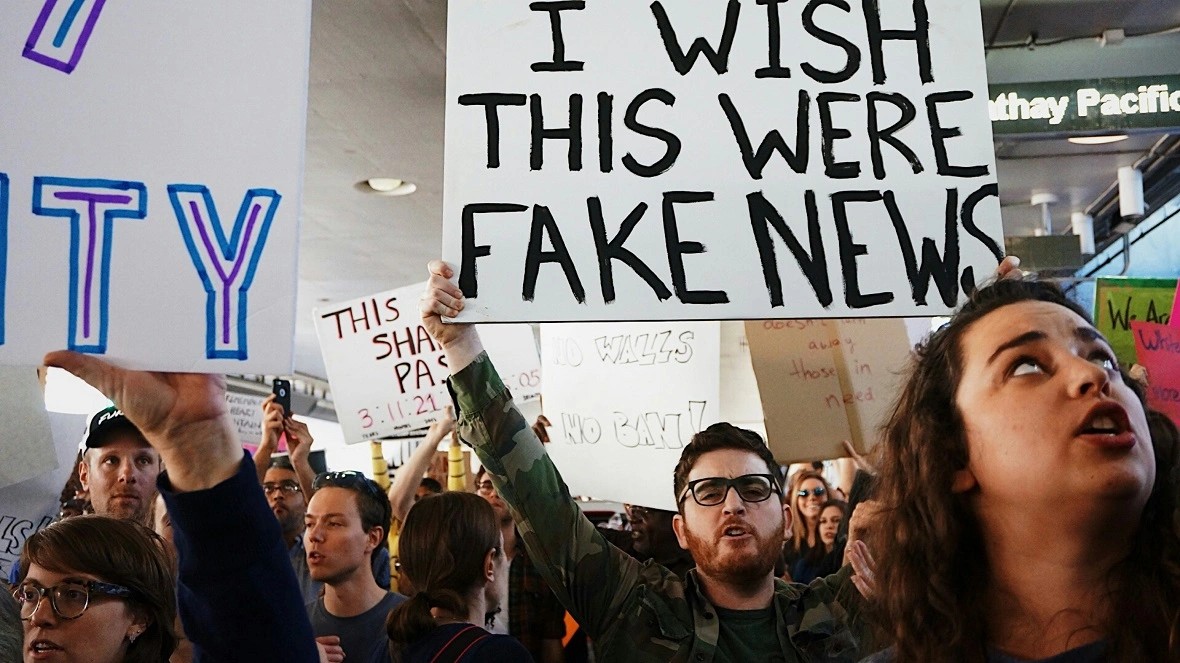As the 2024 presidential race gains momentum in the United States, experts warn that disinformation, malicious use of deepfakes, and AI are hampering the American electoral contest.
From fake Joe Biden robocalls to Russian and Chinese digital campaigns that aim to interfere with the elections, the cybersecurity industry and the government are on high alert when it comes to raising awareness among US voters.
Here at Moonlock, we have just released its Scams & Disinformation Survey Report. The goal of this research was to determine whether Americans can tell fact from fiction and how widespread malicious content is.
Shockingly, we found that approximately 7 out of 10 Americans have experienced 1 type of scam in the past year, and more than half (52%) have encountered a political scam during the same period. Additionally, US respondents are concerned about AI, with 64% saying they believe the technology gives scammers a big advantage.
A history of US election interference that promises to get worse in 2024
Disinformation and election and political digital scam campaigns are not unique to the 2024 US election. These types of malicious attacks on the US population have been going on for several years.
In July 2018, two years after the 2016 US presidential election, the FBI announced that a federal grand jury returned an indictment against 12 Russian military intelligence officers for their alleged roles in interfering with US elections in 2016.

Similarly, in December 2023, the US Department of Justice, Homeland Security, and the Cybersecurity and Infrastructure Security Agency (CISA) analyzed the 2022 mid-term election and found evidence of foreign government-affiliated and criminal cyber activity targeting election infrastructure. The attacks were linked to cyber actors and hacktivists supported by China and Russia.
In an effort to understand and analyze the prevalence of political scams and disinformation, as well as the level of US public awareness on the subject, Moonlock conducted the Scams & Disinformation Survey report. Here’s what we found.
Key findings of the Scams & Disinformation Survey Report
The key findings of the Scams & Disinformation Survey Report paint a concerning and, at times, paradoxical picture:
- Half of respondents said they come across news they find fake or manipulative at least once a week.
- Most respondents expressed high confidence in identifying fakes and disinformation. Such a perception can pose substantial risks due to a potentially false sense of security.
- Younger Americans are more susceptible to scams.
- 67% of Americans have experienced at least 1 type of scam in the past 12 months.
- 52% of Americans have experienced some type of political scam over the past year.
- Most Americans expect to see misleading information on social media. Online news and podcasts also rank high.
- 64% of respondents believe that AI gives a higher advantage to scammers than those who fight them.
- Americans are generally less aware of political scams than of nonpolitical fraud and phishing.
- Only 36% of respondents had heard about deepfakes of politicians and knew how they worked, which is alarming in the era of widespread AI use.
The low rates of concern expressed by those surveyed reveal that as phishing, disinformation, and fake news become the norm, Americans may have “normalized” the situation.
Oleksandr Kosovan, founder and CEO of MacPaw, spoke about the report, the rise of AI, and the risks it poses to democracy in the US.
“The intersection of AI advancements and the rise in online scams is a crucial area of exploration for Moonlock, as it aims to make cybersecurity more accessible to everyone,” Kosovan said.
“The goal of the survey is to draw attention to public awareness and cybersecurity, ensuring individuals everywhere are prepared to counter digital threats.”
The goal of the survey is to draw attention to public awareness and cybersecurity, ensuring individuals everywhere are prepared to counter digital threats.
Oleksandr Kosovan, CEO of MacPaw
64% of Americans have never heard of scams featuring deepfakes of politicians
AI-powered deepfake generators are getting better and more accessible every day, with new hyper-realistic models such as the Microsoft VASA-1 deepfake, proving just how dangerous the tech can be when misused. The threat to the public has never been greater. Even experts have a hard time differentiating real humans from fake digital avatars.
However, Americans seem to be unaware of the risks during an election, with 64% of those surveyed admitting they have never heard of scams involving deepfakes of politicians and are unsure of how they work.
Strangely, half of Americans reported they encounter fake or manipulative news at least once a week. This contradictory finding signals a troubling disconnect.
The lack of awareness constitutes a serious gap. For example, recent AI-generated robocalls that imitated President Biden’s voice reached over 20,000 people and received global news coverage. Similarly, other deepfake incidents have been in the news constantly.
Half of Americans experienced at least one type of political scam over the past year
Public cybersecurity awareness continues to be a major factor shaping the cybercriminal underworld and the state of American and global election security.
The 2023 Verizon Data Breach Investigations report found that cybercriminals choose to start most cyberattacks with phishing and other social engineering techniques — a fact that speaks to users’ awareness deficits and lack of cybersecurity hygiene practices. In fact, according to the report, more than 7 out of 10 breaches depend on human error linked to email phishing.
The new Moonlock survey found that while 52% of Americans experienced at least 1 type of political scam over the past year, users are generally less aware of political scams than they are of nonpolitical fraud such as phishing, fake websites, identity theft, and classic scams like the Nigerian Prince, romance scams, and lottery scams.
Moonlock concluded that Americans are less worried about these nonpolitical scams than they are about disinformation and fake news, even though the former occurs more frequently.
For example, 42% of respondents report that they have experienced disinformation and fake news, but only 37% are concerned about it. Shockingly, only 22% are concerned about deepfakes of politicians, and just 24% are worried about fake survey polls.

Bridging the gaps: From knowing to taking action
Rather than signaling confusion or contradictory results, the new Moonlock survey shows that there are wide gaps when it comes to Americans applying what they know to be true, even after personally experiencing serious security incidents.
Although most Americans are wary of the latest scam trends and don’t engage with scammers, 1 in 4 interacts with them and is later affected by negative outcomes.
Young Americans are most susceptible to scams
While numerous reports suggest that new generations — born digital natives — are more tech-savvy than older generations, other studies, such as the Dell Technologies Future Proof, show a completely different scenario.
Dell found that more than one-third of Gen Z felt that their school education (under age 16) did not prepare them by providing the technology skills needed. More than half (56%) said they receive either very basic or no digital skills, and only 40% of Gen Z consider learning new digital skills.
The Moonlock survey presented further evidence of these generational tech skill gaps, surprisingly revealing that younger Americans are more susceptible to scams, especially while on social media and dating platforms.
The majority (65%) of Americans aged 18 to 24 have engaged with scammers, while only 35% of those aged 65 or older experienced the same. Additionally, 31% of US citizens under 35 have experienced negative consequences from scammer interactions, while only 17% of those aged 55 or older reported the same.
While 81% of Americans believe they do everything in their power to avoid online scams, 80% also believe that no one is immune to fraud. Furthermore, trust in new technologies like AI is low. Only 44% of respondents state that AI can be used to detect and prevent cyber misuse, fraud, and attacks.

America battles disinformation
People in the US are acutely aware of the misinformation deluge on social media. This awareness translates into a cautious approach — they generally avoid sharing unverified information. However, a troubling disconnect emerges when we delve deeper.
Despite their vigilance, a significant portion of Americans (40%) bypass established fact-checking websites for verification, opting instead for unspecified sources they consider reliable.
This reliance on unvetted resources raises concerns. While the decision not to amplify unverified information is commendable, the quality of the alternative verification methods remains unclear. As mentioned, age seems to play a role, with older demographics exhibiting greater caution when sharing on social media. However, this caution may not necessarily translate to a more sophisticated approach to verification.
The disconnect between awareness and action presents a challenge. Decision-makers need to bridge this gap by promoting media literacy initiatives that not only highlight the dangers of misinformation but also equip Americans with the tools to effectively verify information.
Fact-checking resources offered in user-friendly formats, alongside educational campaigns that emphasize the importance of reliable sources, can empower citizens to become more discerning consumers of information in the digital age.
Americans think they will most likely experience disinformation on:
- Social media: 68%
- Online news outlets: 43%
- Podcasts: 39%
- News aggregators: 35%
- Newspapers and their websites: 32%
- TV news: 31%
- News agencies: 28%
- Magazines: 28%
- Radio: 24%
What Mac users think about deepfakes, political scams, and disinformation
The perception that Mac computers are immune to security threats persists, but the reality is that macOS users are facing a surge of attacks, including targeted scams.
The Moonlock report on 10 macOS security trends in 2024 revealed a dangerous escalation in Mac stealers, increased ransomware operations targeting macOS, nation-state hackers, and AI-powered attacks going after Apple users.
Still, despite the challenges, Moonlock’s recent survey reveals a silver lining. Mac users demonstrate a higher level of awareness regarding scams and disinformation. This seems to imply that they are more cautious consumers of information compared to the general public.
Mac users exhibit a demonstrably higher awareness of political scams (48% vs. 40% overall) and scams in general (53% vs. 47%). This vigilance may be attributed to their news consumption habits. Mac users tend to be more engaged with diverse news sources, including newspapers, online outlets, and podcasts. This potentially exposes them to a broader range of information, including warnings about scams.
Furthermore, Mac users exhibit heightened concern about deepfakes (41% vs. 32% overall). This aligns with their increased trust in AI’s potential to combat scams (54% vs. 44%). In general, Mac users appear to be more aware of political scams but are also more likely to come across disinformation. Fortunately, Mac users are more concerned about deep fakes.
Conclusion: Gaps in knowledge expose critical vulnerabilities
The Moonlock Scams & Disinformation Survey Report shows that Americans are exposed to a constant stream of disinformation, with political scams becoming a worrying norm. Despite a general awareness of fake news, a troubling knowledge gap exists regarding deepfakes, a potent tool for electoral manipulation.
Americans’ confidence in identifying fakes is undermined by a critical vulnerability — a lack of awareness about specific threats like deepfakes. This creates an environment where bad actors can exploit this gap in knowledge.
The report also identifies some surprising generational divides. Younger Americans, despite being digital natives, appear more susceptible to scams, highlighting the need for targeted education efforts.
Finally, the survey reveals a concerning trend: Americans are bypassing fact-checking, relying instead on unvetted verification methods, weakening the fight against misinformation.
Educational campaigns and user-friendly fact-checking resources must be utilized to empower Americans to become discerning consumers of information. Tailored educational programs can bridge the generational knowledge gaps regarding scam awareness. Fact-verification skills and public education campaigns are also needed to highlight the dangers of deepfakes. These programs can equip citizens with the knowledge required to identify fakes, scams, and cyberattacks.
The fight against disinformation is a collective effort. By working together — policymakers, educators, cybersecurity professionals, and the public — a more resilient democratic process is possible, one equipped to navigate the complexities of the digital age and safeguard the integrity of elections.
This is an independent publication, and it has not been authorized, sponsored, or otherwise approved by Apple Inc. Mac and macOS are trademarks of Apple Inc.






